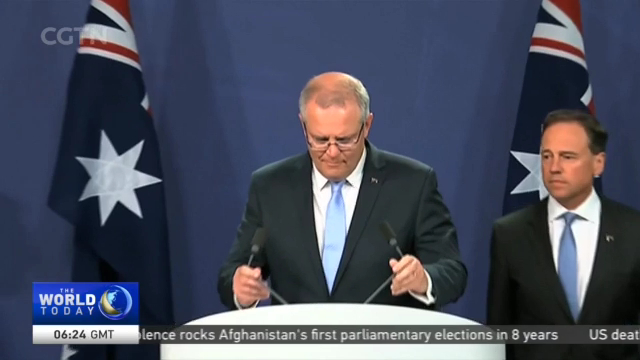
14:51, 21-Oct-2018
Migration Policy: Big cities in Australia take measures to deal with overpopulation
Updated
14:19, 24-Oct-2018
03:26

Australia's government wants to restrict many new migrants from living in some of the country's largest cities. It's part of a plan to alleviate population pressures in Sydney and Melbourne. But critics say the new visa restrictions are too vague and don't really address the country's growing infrastructure problems. Greg Navarro has the story.
Just about everywhere you look in Sydney and Melbourne - the roads are getting busier, sidewalks are more crowed and public transportation is becoming increasingly taxed to deliver on time.
LAURENCE TROY, CITY FUTURES RESEARCH CENTRE UNIVERSITY OF NEW SOUTH WALES "It's not just congestion on the roads, it's also accessing services, congestion in schools, I mean that is another big topic of conversation in Sydney for example, then there are all of the other public services that you might expect - healthcare and so on."
Australia's government says its major cities are among the fastest growing in the world - the result of unplanned population growth as an increasing number of migrants are flocking to major metropolitan centres.
ALAN TUDGE AUSTRALIAN URBAN INFRASTRUCTURE & POPULATION MINISTER "And so the opportunity is to get a more even distribution of that growth which supports those smaller states and supports those regions that are looking for more people and in the process taking a bit of pressure off the big cities of Melbourne, Sydney and southeast Queensland."
The government plans to do that by restricting skilled migrants - who account for about 40% of all new migrants - from living in the country's major cities for up to 5 years.
SCOTT MORRISON AUSTRALIAN PRIME MINISTER "To ensure that we can direct and encourage those who are coming to the country initially on a temporary basis and through those non-permanent visas, to be able to go where there is a need for this labour, where there is a need for population growth and where there is a receptivity to it."
But University of New South Wales research fellow Laurence Troy, who studies urban planning says solving the population pressures facing Sydney and Melbourne isn't that easy.
LAURENCE TROY, CITY FUTURES RESEARCH CENTRE UNIVERSITY OF NEW SOUTH WALES "Cities are complex beasts and addressing the issues of growth and the problems that cause is really about how we plan cities and we really haven't done that particularly well over the last couple of decades."
Immigration has become an increasingly popular political issue in Australia, with growing calls for restricting the country's intake. Entrepreneur Dick Smith spent a million dollars of his own money to create an ad warning of the dangers of overpopulation.
GREG NAVARRO SYDNEY "Supporters of the plan want it to extend to higher education in this country, saying that a growing number of students using it as a path to immigration."
But experts point out that international students in New South Wales alone generate more than $11 billion AUD. And some academics say the government's plan doesn't address the potential impact on smaller regional centres.
STEWART JACKSON, LECTURER UNIVERSITY OF SYDNEY "Are the jobs going to be there, is the infrastructure going to be there, is there going to be incentive for people to move there or will it be if you come to Australia you have to live in the country for 5 years - what does that do for skilled migration when there might actually be a need in those cities?"
The government hasn't provided details on how the plan will be enforced - but did say that it would likely include incentives for migrants. Greg Navarro, CGTN, Sydney.

SITEMAP
Copyright © 2018 CGTN. Beijing ICP prepared NO.16065310-3
Copyright © 2018 CGTN. Beijing ICP prepared NO.16065310-3